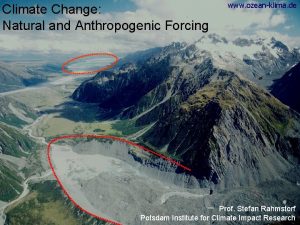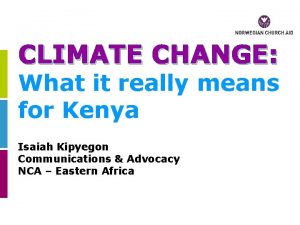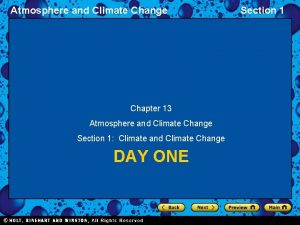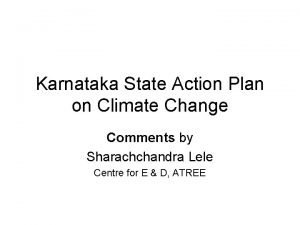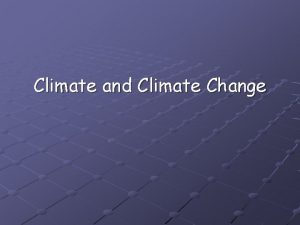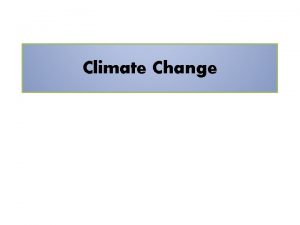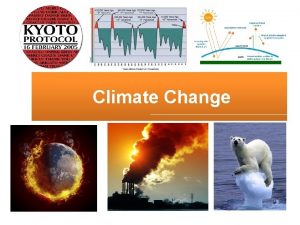THREATS AND IMPACT OF CLIMATE CHANGE CASE STUDYUGANDA











- Slides: 11

THREATS AND IMPACT OF CLIMATE CHANGE: CASE STUDYUGANDA ITU Workshop “Moving to a Green Economy through ICT Standards” 6 th -8 th September 2011 By: Nakiguli Helen Cynthia Uganda Communications Commission

CONTENT Background Threats/risks Current indicators/impacts Constraints of conservation and adaptation Possible strategies and interventions Proposed/potential interventions for ICTs to Tackle climate change • Conclusion • References • • • 2

BACKGROUND Uganda-Land locked country Popn-35 m with growth rate of 3%pa Wetland-15% of total land area⁽⁵⁾ Trees, forests, woodland 14% of land surface (45% in 1890)⁽⁵⁾ Holiday like weatherpleasant and enjoyable temp Agriculture as main stay of its economy (const. 34% of GDP, 81% of country's employment, therefore vulnerable to climatic variations) 3

THREATS/RISKS 7% of original wetland in Uganda-converted to other land issues -loss of biodiversity⁽²⁾ 82% of households use firewood for cooking, 15. 2% for charcoal, 94% biomass of all energy consumed⁽²⁾ Current rate of population growth is too high to ensure sustainable use of ENR 7% of households receive main grid electricity⁽¹⁾ Increasing demand of forest products and forest land Increased climate variability- too many rains in some areas and drought in other areasfarmers uncertain of cessation of rainfall seasons 4

CURRENT INDICATORS/IMPACTS Climate Variability Prolonged heavy rains Increased floods, Home displacement, Elnino rains (1997/98)- claimed lives-cholera Destroy infrastructure, Reduced agriculture prodn, Landslides -Bududa Shortage of rainsdrought Food shortage, Disease prone, Death 5

Mabira forest reserve(above), Siltation impact on lake Wamala (below)⁽⁸⁾ Wetland river bank degradation (above), Kampala-Byaise flooding (below)⁽⁸⁾ 6

CONSTRAINTS OF CONSERVATION/ADAPTATION Technical • Meteorological centers. Low capacity in both financial and human resources to acclimatize to climate change-Limited requisite expertise ⁽¹⁾ • Weak coordination mechanisms⁽¹⁾ • Un reliable scientific data Social Economic • Inadequate conceptualization of the importance of weather and climate information⁽¹⁾ • Limited awareness levels-comfortable with what we have/blindness- as it was, it shall forever be…. Low appreciation of the challenge • Increasing population-high agricultural and settlement demands Political • No safety regulations, policies, guidelines developed • Political interference and investments 7

POSSIBLE STRATEGIES AND INTERVENTIONS • National climate change policy • Identify every sector role in climate change actions • Identify how ICT can aid in monitoring, mitigation and adapting to climate change • Increase awareness • build capacity through institutional manpower development • strengthen climate /weather monitoring Implementation of the UNFCCCactivities⁽¹⁾ Redefine climate change into development planning Implement various climate change interventions and strategies Provide and promote incentives for clean development • Develop and implement incentive mechanisms for reduced emissions • E-waste management • Clean energy-renewable energy sources 8

PROPOSED/POTENTIAL INTERVENTIONS FOR ICTs TO TACKLE CLIMATE CHANGE Green ICT services/facilities and products • Renewable energy sources for powering ICT facilities in rural areas • support smart communications- e-meetings, teleconferences Environmental monitoring • Construct automatic weather monitoring stations, early warning system in disaster prone areas⁽⁹⁾ • Data capturing and recording of GHG emissions • Build capacity in environmental monitoring using ICT E-waste management • Develop and implement an e-waste management policy • Establishment of regional collection centers, recycling and disposal of E-waste • Sensitisation of e-waste management • Incentives in place for e-waste collection 9

CONCLUSION • Current trends indicate persistent degradation in ENR • Reduced agricultural production • Climate change will affect every sector of development • Uganda is making concerted efforts to combat /deal with climate change • Important to identify priority activities that respond to adaptation of climate change-opportunities to develop climate change mitigation and adaptation programmes. • ICTs can play a major role in mitigating impacts of climate change as well as aiding climate change adaptation. 10

REFERENCES 1. 2. 3. 4. 5. 6. 7. 8. 9. National Development Plan(Uganda)2010/11 State of the environment report for Uganda 2008 Climate change and agriculture 2008 Hidden Heat: Climate Change in Uganda (Google-20/8/2011) A content analysis report on climate change impacts, vulnerability and adaptation in Uganda (2001) Status of forests in Uganda- Africa Journal of Ecology Assessing the impacts of climate change in Uganda –World water assessment programme Applications of ecosystem approach in environmental inspections (NEMA) ICT and climate change- Ministry of ICT, Uganda 11
 Climate change 2014 mitigation of climate change
Climate change 2014 mitigation of climate change Impact of climate change on forest ppt
Impact of climate change on forest ppt Threats to biodiversity a case study of hawaiian birds
Threats to biodiversity a case study of hawaiian birds Best case worst case average case
Best case worst case average case Why are tropical climates so hot brainpop
Why are tropical climates so hot brainpop Ozeanklima
Ozeanklima Climate change meaning and definition
Climate change meaning and definition Atmosphere
Atmosphere Chapter 13 atmosphere and climate change
Chapter 13 atmosphere and climate change Persuasive essay about global warming
Persuasive essay about global warming Karnataka state action plan on climate change
Karnataka state action plan on climate change Unit 9 climate change
Unit 9 climate change





